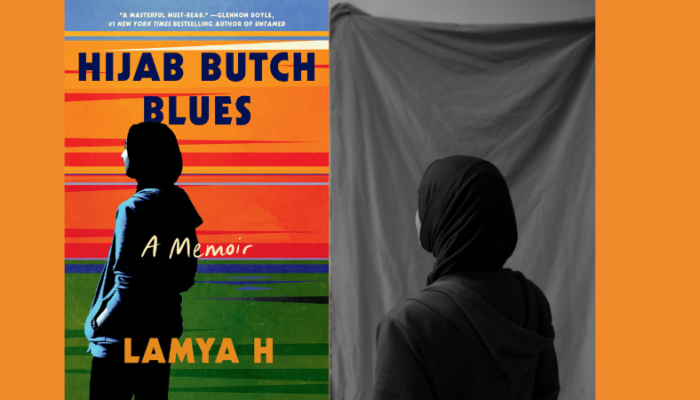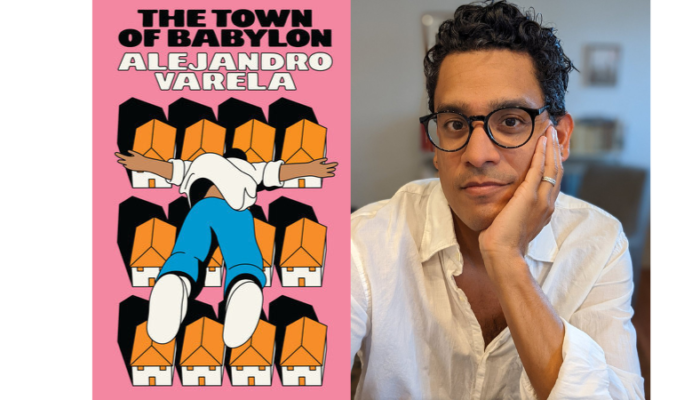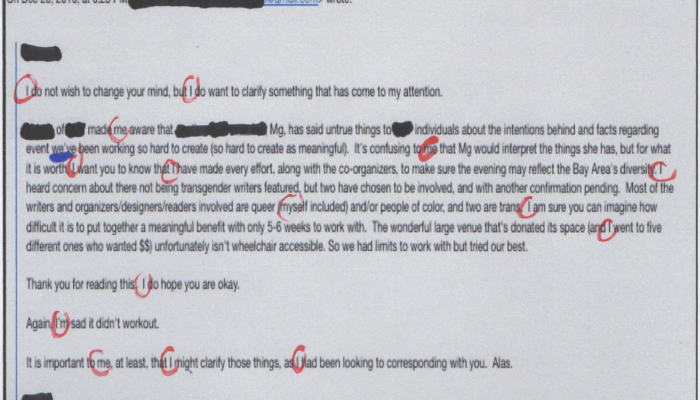Issue 4 contributor Migueltzinta Cah Mai Solís Pino and writer Luke Dani Blue dialog on community censorship and the problem of “invulnerable writing”.
MCS: So let’s go on the homo-holodeck for a second.
LDB: OK. *makes appropriate gay Star Trek noises*
MCS: OK, computer, initiate program where Luke has just published a short story in The Paris Review, she’s posted it on Facebook, everyone has Liked it.
LDB: I’m digging it.
MCS: Computer, Luke and I are now at a brunch with our queer friends and I am boasting to them about how great her story is and isn’t it amazing that she got into TPR. Surprise! They offer half-hearted congratulations. They only read part of it. They give Luke weird ice stares and frost-misted shoulders.
LDB: Bitches. And also, yep. I know we’ve both received plenty of those looks. But it’s more than the look. It’s the ring of silence that surrounds any creative achievement/expression that isn’t packaged as a political fundraiser or consciousness-raiser. And you know, if it was one time, it wouldn’t matter. But that icing-out has infinite microaggressions. It makes me think about when I was in my early twenties and every time I’d suggest to my queer activist friends (all talented artists themselves) that maybe I might sometimes want to get an MFA, they’d ice-stare me or say, blandly, “Why would you want to do that?” Versus the six months I wanted to be a therapist and everyone in my social circle was like, “You’d be an awesome therapist!! Go do it!!”
MCS: What the hell? Even when we aren’t successful it’s like queers are the first to punish queer artists. They punish us for achieving, for being noticed, they punish us for pointing out flaws in the queer-system with our art. Contemporary queers punish the avant-garde.
LDB: And usually there’s some pseudo-moral (aka “political”) reason for the punishment. Someone did something “fucked up”. E.g. you’re selfish because you proudly tweeted about the piece you just published instead of jumping on the OMG-we-hate-Rupaul-because-he-says-‘trannies’! bandwagon.
MCS: Oh my god, it’s so true.
LDB: So, what I think we’re saying is that there’s a silent/subtle expectation about the work we (female-socialized queer creative types) should be doing. e.g.: therapy, social work, elementary school teacher, homeless advocate, activist, fundraiser, nurse, healthy food-providers–any of the traditional female professions would be considered acceptable by that community. Slam poet, yes. Novelist, no. Not unless you publish on an explicitly queer press and direct your work toward an exclusively queer audience.
MCS: Right. I imagine my “appropriate” work would involve activism, slam poetry, Chicano poetry circa Gloria Anzaldúa/Luis Rodriguez. Which had it’s time! Without those minds we would not be where we are now. But, these categories are not at all good representations of what I do. It makes me really mad that people have these bizarre expectations of my work. Old school Chicano poetry is so straight and, honestly, I don’t think I have a single slam poetry bone in my damn body. What’s worse, I have the most inconsistent and, just, the most shady politics ever.
LDB: (Aw. I love your shadyass politics. They are the footie pajamas of politics.)
MCS: You’re making me blush.
LDB: Well, fuck, I started out in slam poetry––and it was an incredible education about writing, voice, audience and the world. At age 17. But by age 30, shouldn’t my work have grown? And your work is subversive like actually subversive as in, interested in turning the received knowledge upside-down and shaking it. Or blowing it inside-out. You can’t do Gloria Anzaldúa, because Anzaldúa did Anzaldúa. And that was thirty years ago, right?
MCS: Yet people try and they expect me to try.
LDB: Right, which is just as racist/limiting––if not more––than what mainstream artistic culture puts on you. The queer community should be embarrassed to attempt to remake the art of the 80s in 2014. What’s “queer” about that? What’s dangerous about fluently mastering the received language? I’m thinking here of the many queer performance nights that state and restate certain realities of oppression that the performer first encountered in a gender studies class, maybe even through the poetry of Audre Lorde or Adrienne Rich. Though most of these audience members have experienced many such performances and hold well-defined views that dovetail almost perfectly with those being performed, they stand up cheering as if it were the first time they’d heard that truth spoken aloud. If the role of art is to create catharsis for tired activists and social workers who want to retreat into a “safe space” where they can briefly stop fighting/arguing about -isms, then great. But if we want art that honors the tradition of Anzaldúa, Lorde, Rich, Baldwin, etc. we need to be more disruptive, aim for discomfort, upheaval, more dispute, more shocks to the system. The fact that something was “revolutionary” (i.e. startling, destabilizing, subversive) in 1985 means by 2014, it has lost its power to destabilize.
MCS: Exactly. That was a long time ago, people! The face of racism, sexism, heterosexism––the face of -ISM has changed. The art, the writing that addresses it has to change too. Man, this is some master’s tools shit we are talking about. When queers can’t support queer futurity, when people of color are holding their most daring artist rebelry back… what happens? This is why I want to talk about slam poetry and naturalist writing as two sides of the same coin. Don’t give me that look. Bear with me for a second. Because, OK, I’ve simplified the ancient soul of white inspired, heh, American writing, to naturalist writing. I think you’ve described it best. Writing concerned with the tiny…? You said it so well.
LDB: Details.
MCS: Ah, yes, details.
LDB: OK, but can I first say, I love some naturalist writing. I even sometimes write naturalist-ically. The best contemporary practitioners of it (e.g. Jesmyn Ward) can make really powerful work with those ingredients. So the problem isn’t naturalism–it’s compulsory naturalism. Or naturalism as the highest form of literature–the only true literature. Or whatever. My definition would be: writing that curates realistic, sensory detail as means to express the (usually) quiet, below-the-surface emotions. In its most egregious (boring) form: the quiet tensions of the married couple driving through the snowstorm–and at the end of the story one of them says, “Well.”
MCS: Ugh!
LDB: But it can be really interesting, landscape-centered writing too. I don’t think it’s doomed. Just overused. And naturalist writers often forget that imagination is part of the “realistic” experience (I’m stealing a quote from my teacher, Nona Caspers, here).
MCS: Yes. So thats one side of this coin. On the other side we have slam poetry, the form assigned to writers of color. Now as you’ve said slam poetry is a language important to empowerment, identity development. It has a very specific history and has been adopted, adapted and co-opted from black urban cultures into academic, activist and queer cultures. Raw Talent is an example of slam poetry and its similar hybrids being a vehicle for not only empowerment but critical thinking and a beautiful demand for visibility.
LDB: Yes, absolutely. (Raw Talent is a youth performance poetry group based in Richmond, California that we lo-ove.)
MCS: But even just seeing these poets from one year to the next, it’s clear that they continue to refine their craft, they experiment with new forms and adapted forms, they mix genres––theater, poetry, film, music. This is something I don’t see many writers doing. The artists at Raw Talent recognize that they do not have to be bound to one form or genre. That in itself is a form of artistic empowerment, an act of identity hybridization. You know, they free themselves from their assigned form. Thinking about entrapments I’ve encountered in my own work, I think about the classic Chicano trope of landscape as beautiful and uncomplicated. Very noble savage-y, “ehr-erts-sher-beherterful” narratives confined to pastoral microcosms. My writing definitely gets caught in this whirlpool. And I resist it even though I feel like I get a lot of social reward for it.
LDB: Ha! I’ve never thought about that, but I can see where that’s chasing you in your work…
MCS: I was excited to hear Ricardo Tavarez’s poem-essays about food a few months ago. I think the poems managed to weave images from colonialism and pre-hispanic cosmology with food porn into a simple, beautiful, poignant composition. It was seeking to complicate the mestizo narrative. The pieces talked about food and landscape––the assigned themes of Latin@ literature––and managed to complicate the ideas, mixing essay and poetry, while still having the emotional investment, the love of the themes. I mean, god, this is why Leslie Marmon Silko is my hero––she doesn’t give a flying fuck! She will complicate the shit out of the mestizo narrative, even if she gets a torch wielding mob coming after her. Makes me think of what you were saying recently about slam poetry, something about vulnerable writing versus…
LDB: …writing that resists vulnerability? Yeah. I’m pretty obsessed with this. The problem of the invulnerable writing. That phenomenon is of course ubiquitous. Because, really, if we can be cool without being vulnerable, most of us will choose that. Social status goes up, no risks taken. Good deal. So what’s so disturbing about–can I call it institutionalized?–slam poetry, is that it seems to require, or pathologically reproduce, invulnerability via cliche and familiar tropes. I’m thinking here of the poet we saw the other night who referenced his nationality in each one of his poems…
MCS: That guy.
LDB: …And each time as a symbol of long-suffering victimhood, noble carriage under stress. In terms of reflecting a political reality, it may be true––or true-ish––but it’s not art. Art isn’t telling ourselves (the artists) what we already know. That’s invulnerability. To be up on the soapbox handing out answers, converting the masses. That’s propaganda or marketing or evangelism, and it may be effective for political parties but it’s not willing to risk true change, or transformation, or breaking open, or being faced with the unknown in yourself.
MCS: Yeah, it’s not about writing the text that has all the answers.
LDB: Like with Silko’s writing, it’s the complication that’s important. And the fact that you feel––you see in the writing––that she’s complicating (versus catharsis-izing) something in herself, and in the reader, that she’s exploring questions, turning something over.
MCS: Makes me think about Danez Smith’s “not an elegy for Mike Brown”.
LDB: Yeah, totally! Smith is risking truth in that poem. The deep, gnarly, ugly kind of truth like that algae-like slime of rotten hair you pulled out of our drain.
MCS: But without the chopstick.
LDB: Yeah, no chopstick. (It’s a metaphor.) Dark and dank, that thing that needs to be pulled up, that resists being pulled up.
MCS: Yeah, I had to take the U-bend off.
LDB: You get that I’m not actually talking about your DIY plumbing job, right? So, um, back to serious things about DANEZ SMITH THE WRITER. His subjects are the same as so many slam poets–so what makes the work move? I’m not 100% sure, but I think it has to do with language and the willingness (need?) to implicate himself in the poem. Implicating being, in my mind, different from blaming. Blaming is: ‘it’s our fault.’ Implicating is a question: ‘how does this involve us? Even if we’re not the originators of this injustice, this grief, this unspeakability, how are we changed by it, transformed around it?’ That’s art. Bringing the monster into the living room. Saying, let’s look at this together, let’s look at ourselves looking at this. That empowerment-based slam poetry can do that too––if it’s your first time with the idea of homophobia or rape or white supremacy or whatever. But once you know those things, you have to go back for a bigger monster.
MCS: Right, because monster-less writing wastes everyone’s time.
LDB: Yeah. You have to look inside yourself––or whatever is most beloved to you––for a monster. I mean, what do I know? I’m nobody. But I know that. I know the feeling of pulling up something nasty that no one wants to acknowledge, and I can recognize when someone else is doing that––whether in art or conversation or via Twitter or whatever. Anyway. You were talking about a…um…a coin? Two sides to a coin?
MCS: Well, so, it’s not so much a coin anymore, as it is an equation, what you’re saying really completes this equation. That certain, special white naturalism that dominates the literary world is the same as what you have so aptly called institutionalized slam poetry, which is the same as what I think I’ll call masculinist Chicano pastoral literature. Multiply this over what seems like years and years and YEARS of uncritical recreation and you have writing that has no monsters, no vulnerability, you have a lot of non-art. I mean, shit, it seems like the stage is set for some really fearless feats of writing. And, you know, if people want to punish artists for succeeding, fuck them! It’s going to be all about that Taylor Swift song.
LDB: (?)
MCS: You know, haters gonna hate, hate, hate, hate, hate –
LDB: That’s why they call them haters.
MCS: But we, we’re just gonna shake…shake…shake…
LDB: Oh yes we are.
 MIGUELTZINTA CAH MAI SOLíS PINO was raised in Mexico and California. He earned his BA from The Evergreen State College in interdisciplinary studies (Chicana/o, post-colonial, landscape and queer studies, experimental writing and media). His work has appeared in Midnight Breakfast. He is also a VONA/Voices 2014 alumnus. For more of Migueltzinta’s work, including visual and performance art, please visit cauhboi.wordpress.com
MIGUELTZINTA CAH MAI SOLíS PINO was raised in Mexico and California. He earned his BA from The Evergreen State College in interdisciplinary studies (Chicana/o, post-colonial, landscape and queer studies, experimental writing and media). His work has appeared in Midnight Breakfast. He is also a VONA/Voices 2014 alumnus. For more of Migueltzinta’s work, including visual and performance art, please visit cauhboi.wordpress.com
 LUKE DANI BLUE’s stories have appeared in Midnight Breakfast, Slush Pile Magazine and Bluestem Magazine. She has received Honorable Mentions from the Fourteen Hills Michael Rubin Book Award and the Academy of American Poets’ Harold C. Taylor Award. A lifestyle trespasser, she has lived on every side (?) of the gender spectrum, in cities from Mexico City to southeast Michigan to Philadelphia to Olympia, WA. Luke now resides in Oakland, CA where she teaches creative writing, owns an astrology business and writes an astrological advice column for The Tusk Blog.
LUKE DANI BLUE’s stories have appeared in Midnight Breakfast, Slush Pile Magazine and Bluestem Magazine. She has received Honorable Mentions from the Fourteen Hills Michael Rubin Book Award and the Academy of American Poets’ Harold C. Taylor Award. A lifestyle trespasser, she has lived on every side (?) of the gender spectrum, in cities from Mexico City to southeast Michigan to Philadelphia to Olympia, WA. Luke now resides in Oakland, CA where she teaches creative writing, owns an astrology business and writes an astrological advice column for The Tusk Blog.




